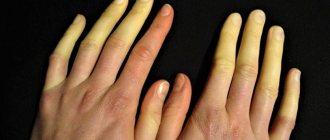Introduction
Let me make a reservation right away that this article is for informational purposes only.
There is no specific information here about which pills you should take and which you shouldn't. Perhaps it will appear in the future. If you don’t want to miss it, you can subscribe to updates in any convenient way (by mail, by joining the VKontakte group, as well as by RSS or via Twitter). Now let's move on to the article itself. There are several different types of pills for social anxiety. The main ones include:
- benzodiazepines
- monoamine oxidase inhibitors (MAOIs)
- beta blockers
- selective serotonin reuptake inhibitors (SSRIs)
- selective serotonin and norepinephrine reuptake inhibitors (SSRIs)
Each type of social anxiety pill has its own advantages and disadvantages, depending on your specific situation.
Tablets for the treatment of social phobia
Social phobia is a mental illness associated with the fear of performing any actions in the presence of strangers, speaking publicly in front of an audience, or being in society. This disorder makes life difficult for people, so it needs to be treated. There are two treatment options: with various therapies and with medications.
Medicines are used in case of refusal of psychological treatment for social phobia
Drug treatment of social phobia is used if the patient refuses psychotherapy, and in other cases it is an additional treatment aimed at eliminating anxiety and stress.
Medicines cannot rid a person of social phobia; they can only suppress some emotions.
The development of medicine does not stand still, and today there are quite a few medicinal methods for treating this disease.
Treatment of social phobia with medications
Pills for social anxiety can have both positive and negative effects. Their advantage is that they can reduce the impact of symptoms on the patient.
But you should understand that their effect is not long-lasting, and it is necessary to take pills frequently, sometimes several times a day, depending on the type of medication.
This can lead to dependence on the drugs, and in the future the standard dose will not have the desired effect. The course of drug treatment usually lasts no more than one month.
When treating social phobia, doctors prefer to combine psychotherapy methods with medications and homeopathic remedies.
Cognitive-behavioral, group, or relaxation therapies help the patient face fear, get used to those situations that frighten him and cause anxiety, and also help the patient develop a new way of thinking about his fears. The advantages of the drugs are as follows:
- Almost all medications are aimed at reducing the unpleasant symptoms of social phobia: rapid heartbeat, excessive sweating, trembling limbs, difficulty speaking, etc.
- The drugs help get rid of negative and obsessive thoughts, thereby stabilizing a person’s mental state.
- Antidepressants are the best way to improve mood and reduce anxiety.
Very often, psychologists and psychiatrists prescribe several medications to their patients with symptoms of social phobia, and sometimes during the course they prescribe different pills for each stage of therapy.
In short-term treatment, psychoactive substances with hypnotic, sedative, relaxant and anticonvulsant effects are used. At the second stage of treatment, patients are transferred to other drugs.
This is necessary to prevent physical dependence.
Duration of treatment
It is necessary to understand that social phobia is a chronic disease, so treatment will be very long: from two months to a year. In approximately 50% of cases, relapses occur after 6 months of treatment. Doctors say that this happens due to abrupt cessation of medication. Medicines should be discontinued gradually, reducing the dose with each dose.
It is worth starting drug therapy with the safest drug. After 4–8 weeks, the doctor assesses the patient’s condition and determines the effectiveness of treatment.
If the symptoms remain unchanged and the patient’s condition does not improve, then it is necessary to increase the dose of the medicine or prescribe another one.
The body's response to drug treatment
Throughout the course of taking medication, the human body’s reaction may be different: excitement and anxiety may disappear, but side symptoms may appear (fatigue, drowsiness, aggressiveness, dejection, etc.). The effectiveness of treatment is manifested in the following changes:
- the patient’s anxiety, which he experiences when necessary for social communication or social activities, appears less and less often;
- a person is often in a relaxed state, due to which he does not perceive the people around him so keenly and can make contact;
- obsessive and frightening thoughts disappear;
- Thanks to the pills, the social phobia gets out of the depressive state faster.
In most cases, the effect of drug treatment begins to appear after 2-3 weeks.
Each body reacts to therapy differently, so you should not jump to conclusions that the drugs do not help.
Under no circumstances should you stop taking the pills, even if there are no changes at the initial stage. Only a specialist can diagnose and determine further treatment.
Thanks to the pills, the severity of the negative reaction to others is reduced
What medications are there for social phobia?
Today, pharmaceuticals are at a fairly high level. There are many different medications available to treat social phobia. All tablets are divided into several types:
- psychoactive substances acting on GABA receptors - benzodiazepines;
- biologically active substances that block the destruction of monoamines by monoamine oxidase - monoamine oxidase inhibitors (MAOIs);
- pharmacological drugs aimed at blocking beta-adrenergic receptors - beta blockers;
- third generation antidepressants intended for the treatment of anxiety disorders and depression - selective serotonin reuptake inhibitors (SSRIs);
- “dual-acting” antidepressants intended for the treatment of severe depression - selective serotonin and norepinephrine reuptake inhibitors (SSRIs).
Each type of tablet is used in certain cases and has both advantages and disadvantages. Side effects can be quite severe and require additional treatment. It all depends on the individual characteristics of the human body.
You cannot select medications on your own; this should be done by the attending physician after a full examination. The choice of any medicine must be approached individually.
Side effects
With a single use of tablets, fatigue, drowsiness, dizziness, decreased thinking abilities, as well as decreased attention and concentration are possible. With long-term use, sexual dysfunction, impaired coordination, and lethargy may appear. When administered intravenously, there is a risk of respiratory distress and decreased blood pressure.
Sometimes the use of benzodiazepines is accompanied by decreased performance, memory impairment, skin rashes, and weight gain.
In rare cases, patients experience nausea, appetite changes, vision deteriorates, nightmares appear, and consciousness becomes confused. There is also a possibility of worsening depression and the emergence of suicidal tendencies.
Benzodiazepines may impair vision
Monoamine oxidase inhibitors
These biologically active substances, depending on their pharmacological properties, are divided into types:
- Reversible MAOIs. Drugs in this group are safe and well tolerated. Moclobemide is prescribed for depression, blocks the destruction of serotonin and norepinephrine, pyrazidol suppresses strong emotional arousal, befol is prescribed for depressive syndrome, anxiety and delusional disorders, hallucinations, incasan is used for mental disorders, sudden changes in mood and in the treatment of alcoholism.
- Irreversible MAOIs. The drugs contain 3 main active ingredients: selegiline is involved in the metabolism of dopamine, increasing the neurotransmitter in different parts of the brain; Rasagiline is an antiparkinsonian drug; Pargyline is an antidepressant used for mental and nervous disorders.
- Selective MAOIs. These substances are aimed at inhibiting one of the types of monoamine oxidase.
- Non-selective MAOIs. These substances inhibit both types of MAO-A and MAO-B. Drugs in this group maintain mental balance, reduce anxiety and anxiety, help recover from depression, and are used in the treatment of mental illnesses.
Therapy with MAO inhibitors and the dosage of medications are determined individually. Patients are prescribed a special diet during the course of treatment and for 2 weeks after it. There are also restrictions on the concurrent use of certain medications.
Benzodiazepines
Description
Benzodiazepines relieve symptoms of anxiety, which is achieved by influencing the central nervous system. Benzodiazepines can cause sedation and addiction, so they are preferred not to be used as a primary medication for the treatment of social phobia.
List of drugs
- Ativan (lorazepam)
- Valium (diazepam)
- Xanax (alprazolam)
- Klonopin (clonazepam)
Causes of social phobia in humans
At birth, a person is genetically transmitted not only the positive qualities of the characters of the ancestors of previous generations, but also their phobias.
Therefore, it is important to be attentive to the education of psychological stability in children, creating the most comfortable environment for the development of a person as an individual. But even a perfectly healthy person can be subject to sudden extreme stress and fall into a long-term feeling of depression.
The following reasons may contribute to this:
- diseases,
- accident,
- unrequited love,
- death of relatives and friends,
- unsuccessful start to sexual life,
- conflict at work, school,
- antisocial lifestyle,
- poverty,
- lack of recognition of talent and potential.
The causes of social phobia can appear at absolutely any age. Mothers who do not want to have a child, or are not ready to raise and educate him, in the first years of a baby’s life can protect him from society, frighten him with his indifferent attitude, make him whiny, irritable and afraid of any rustle.
At the age of 4-6 years, the reason that can lead a person to social phobia in adulthood is an incorrect attitude towards a child who is afraid of going to kindergarten and cannot establish communication with other children. A standard situation is when a child with his whole appearance makes it clear to his parents that he is terribly uncomfortable, but instead of support and help, he receives only firm instructions to “be patient and get used to it.”
Social phobia in adolescents has the highest risk of developing into an acute form. The transition period is accompanied by drastic transformations in the human body, a change in worldview, the definition of one’s role in society, the search for social status, and most importantly, but few people pay attention to this fact, the spiritual development of a teenager.
During this period, there is a risk of withdrawing into oneself, closing oneself off from society, and showing inappropriate actions in response to the slightest misunderstanding or offense, since the film that protects the soul is still very thin and is not able to completely protect a person from external influences: his soul is vulnerable, and his mind not durable.
The cause of the development of social phobia can be any conflict or incident: where the personal qualities of a teenager are affected, his pride is undermined, or a person’s body composition or behavior is ridiculed. All these factors can serve as sparks to fan the hotbed of social phobia in its most acute form, which often leads to suicide, or to the birth of an eternally broken personality, not ready for life in the adult world.
Monoamine oxidase inhibitors (MAOIs)
Description
MAOIs were once considered the most effective pills for social anxiety, but they carry the risk of serious side effects. Currently, MAOIs are not routinely used to treat social anxiety disorder unless there is reason to believe they will be more effective than other medications.
List of drugs
- Nardil (phenelzine)
- Transamine (tranylcypromine)
- Marplan (isocarboxazid)
Dating a social phobe
A person suffering from the disease of fear of society is called a social phobe.
Social phobes try to communicate little, even on the phone; they don’t want to work with people or go to a catering establishment where there are a lot of people. A social phobe is afraid of the contrived importance of the situation; he is afraid of responsibility before a new interlocutor, which is why he is so embarrassed to start a dialogue. He categorically does not want to communicate with strangers, in particular, even with beautiful girls, because he is afraid of showing his worst side when communicating.
Finding himself in an unfamiliar atmosphere in which he needs to communicate and show his best qualities to society, he begins to panic because of the difference in levels between him and his interlocutor. For example, the teacher calls you to the blackboard, it is difficult to imagine that in this situation a healthy person can have equal communication with the teacher, and even more so a socially phobic person. At the same time, the risk of being ridiculed and humiliated in front of the class is quite real, which will undoubtedly aggravate the disease.
Social phobia worries about the need to carry out any social activity. Hundreds of thoughts flow through his head, which develop his unsatisfactory mental state. People with social phobia avoid situations in which they feel outside their comfort zone.











